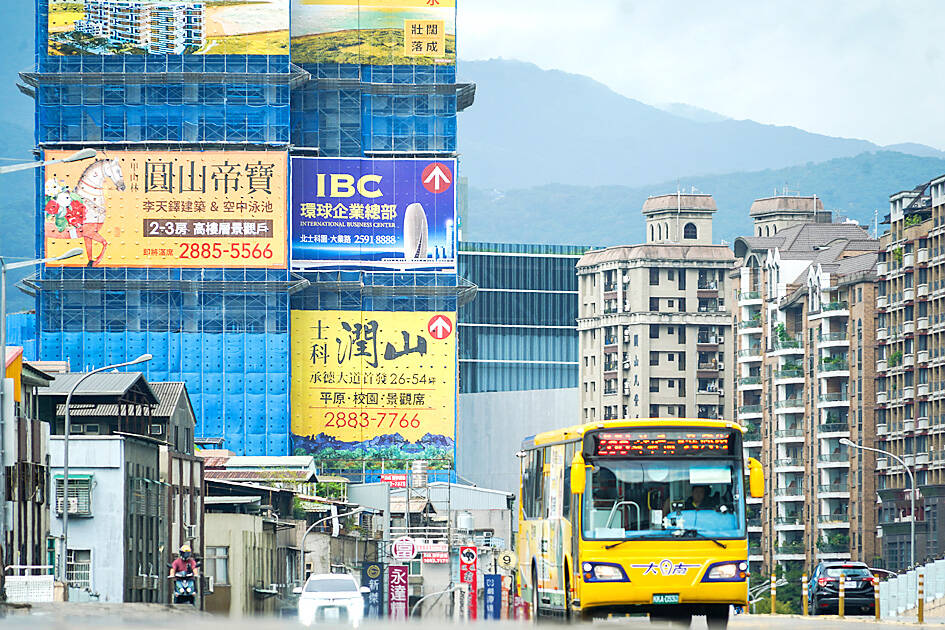Land deals last year soared more than twofold to NT$277.6 billion (US$8.45 billion), as developers actively built up land stock, but it would turn conservative this year amid the central bank’s lingering bid to cool real-estate lending, CBRE Ltd Taiwan (世邦魏理仕台灣) said yesterday.
The value suggested a 116 percent increase from a year earlier, as developers and builders raised land stock, encouraged by the housing fever in the first half of last year, CBRE said.
The uptrend was most pronounced in Taichung, where land deals amounted to NT$58.3 billion, or 21 percent of the total, it said.

Photo: CNA
Taichung-based Full Wang International Development Co (富旺國際開發) last month acquired a 945.31 ping (3,125m2) land plot for NT$1.24 billion, which it aims to turn into apartment complexes targeting first-home buyers, the company’s regulatory filing said.
The plot is near the city’s Shuinan Gateway Park (水湳經貿園區) and the government has completed construction on related public works, Full Wang said.
Meanwhile, commercial properties fared weaker, shrinking 7 percent to NT$125.1 billion last year due partly to a high base the previous year, CBRE said.
Industrial factories underpinned the segment, as tech firms bought idle factories to expand their capacity, CBRE real-estate appraisal head Winston Shih (施甫學) said.
Move-in ready factories in science parks are in demand, accounting for NT$66.1 billion of transactions last year, nearly a three-fold increase to a new high, Shih said.
That included Taiwan Semiconductor Manufacturing Co (台積電) buying an idle plant in Tainan from flat-panel display maker Innolux Corp (群創) for NT$17.14 billion; Micron Technology Taiwan Inc (台灣美光) acquiring an industrial property in Tainan from flat-panel supplier AUO Corp (友達) for NT$7.4 billion; and ASE Technology Holding Co (日月光投控) obtaining two industrial complexes in Kaohsiung for NT$5.26 billion, CBRE data showed.
“The top 10 commercial property transactions are all related to industrial properties, an unprecedented phenomenon,” Shih said.
Developers would turn low-key this year to avoid riling up the central bank, which is to step up inspections of mortgage operations and land financing to slow real-estate lending, CBRE said.
However, industrial land prices would receive further support from the expansion needs of local tech firms, it said, adding that industrial land prices in central and southern Taiwan have advanced 6.5 percent to 10 percent over the past three years.
Local life insurers could display more activism this year if insurance regulators ease yield requirements, CBRE said.

When an apartment comes up for rent in Germany’s big cities, hundreds of prospective tenants often queue down the street to view it, but the acute shortage of affordable housing is getting scant attention ahead of today’s snap general election. “Housing is one of the main problems for people, but nobody talks about it, nobody takes it seriously,” said Andreas Ibel, president of Build Europe, an association representing housing developers. Migration and the sluggish economy top the list of voters’ concerns, but analysts say housing policy fails to break through as returns on investment take time to register, making the

‘SILVER LINING’: Although the news caused TSMC to fall on the local market, an analyst said that as tariffs are not set to go into effect until April, there is still time for negotiations US President Donald Trump on Tuesday said that he would likely impose tariffs on semiconductor, automobile and pharmaceutical imports of about 25 percent, with an announcement coming as soon as April 2 in a move that would represent a dramatic widening of the US leader’s trade war. “I probably will tell you that on April 2, but it’ll be in the neighborhood of 25 percent,” Trump told reporters at his Mar-a-Lago club when asked about his plan for auto tariffs. Asked about similar levies on pharmaceutical drugs and semiconductors, the president said that “it’ll be 25 percent and higher, and it’ll

CHIP BOOM: Revenue for the semiconductor industry is set to reach US$1 trillion by 2032, opening up opportunities for the chip pacakging and testing company, it said ASE Technology Holding Co (日月光投控), the world’s largest provider of outsourced semiconductor assembly and test (OSAT) services, yesterday launched a new advanced manufacturing facility in Penang, Malaysia, aiming to meet growing demand for emerging technologies such as generative artificial intelligence (AI) applications. The US$300 million facility is a critical step in expanding ASE’s global footprint, offering an alternative for customers from the US, Europe, Japan, South Korea and China to assemble and test chips outside of Taiwan amid efforts to diversify supply chains. The plant, the company’s fifth in Malaysia, is part of a strategic expansion plan that would more than triple

Taiwanese artificial intelligence (AI) server makers are expected to make major investments in Texas in May after US President Donald Trump’s first 100 days in office and amid his rising tariff threats, Taiwan Electrical and Electronic Manufacturers’ Association (TEEMA, 台灣電子電機公會) chairman Richard Lee (李詩欽) said yesterday. The association led a delegation of seven AI server manufacturers to Washington, as well as the US states of California, Texas and New Mexico, to discuss land and tax issues, as Taiwanese firms speed up their production plans in the US with many of them seeing Texas as their top option for investment, Lee said. The